#frjohnkelmy
Text

August 15: Solemnity of the Assumption of the Blessed Virgin Mary
65 notes
·
View notes
Text

St. Elizabeth of the Visitation
Saint of the Day
St. Elizabeth of the Visitation (1st c.) was the wife of Zachary, a temple priest, and the cousin and close companion of the Blessed Virgin Mary. She is the one whom Our Lady visited in haste after the Annunciation. The Angel Gabriel had told Mary that Elizabeth was expecting a miraculous child in her old age. Upon hearing Mary's voice, who was then carrying the Son of God in her womb, Elizabeth's unborn child leaped in her womb by the power of the Holy Spirit. It was with Elizabeth that Mary first shared the joy of the Incarnation of Jesus Christ. St. Elizabeth gave birth to St. John the Baptist, the prophet who prepared the way for Jesus' ministry. St. Elizabeth is described in the Gospel of Luke as “righteous in the eyes of God, observing all the commandments of the Lord blamelessly.” St. Elizabeth shares a feast day with her husband, Zachary, on November 5th.
#allsoulspriory#frjohnkelmy#paxabbey#thefellowshipcorner#christsapostoliccatholicchurch#saintoftheday
11 notes
·
View notes
Text
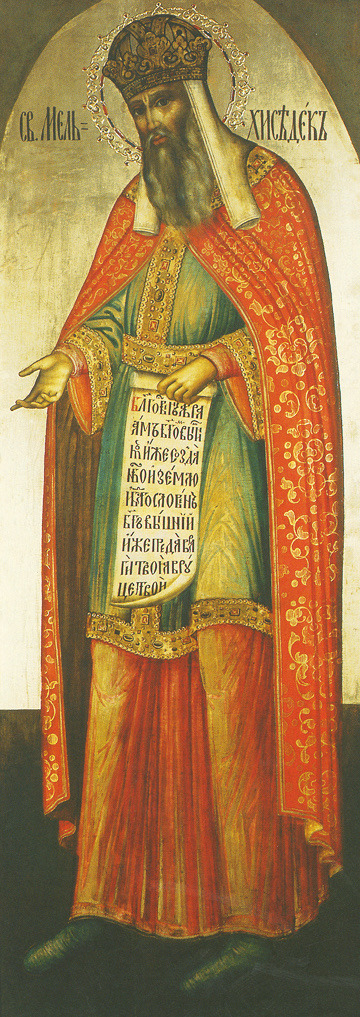
A Psalm Of Blessedness
How blessed is the one who does not follow the advice of the wicked, stand in the pathway with sinners, or sit in the assembly of scoffers? Instead, he finds pleasure in obeying the Lord’s commands; he meditates on his commands day and night. — Ps 1:1-2
The blessed, or Happy, man is described negatively (Psa 1:1). There is a gradation in the attitude, the sphere of influence, and the condition of his companions. In perspective, we may begin by walking, advance to standing, and end by sitting. If we would avoid sitting, let us guard against walking or standing. In the sphere of influence, the beginning of backsliding is when a man listens to counsel; he drifts into the path trodden by sinners and finally is hardened enough to sit where scornful talk surrounds him on every hand—the condition of evil companions. We should be repelled if we were to be plunged suddenly into contact with the scornful, but our moral interests may not be specially outraged by the counsel of the wicked. Indeed, the advice which wicked men give sometimes resembles closely what our heart suggests and our taste prefers. It is so specious, so apparently sensible and natural, that we are captivated by it. Only gradually do we slide from those who forget God to those who set His law at defiance or openly blaspheme Him.
Our motive in going amongst ungodly men must be carefully considered. If it is to help and save them, as our Lord did, no harm will come to us. But if we go into the way of sinners for our own amusement, need we be surprised if the bloom pass off the fruit, and the fine edge from the tool? Let us examine ourselves. Are we startled and shocked now, as we used to be, by an indecent illusion or a blasphemous word? Is there a coarsening process at work? Even where we are not injured by worldliness, we may suffer by contact with the low ideals of our fellow-Christians. Let us watch and pray; let us consider one another and exhort one another day by day, lest any be hardened by the deceitfulness of sin (Heb 3:13).
The Blessed, or Happy, man is also described positively (Psa 1:2). This delight comes as naturally as appetite for food, when the soul is in a healthy condition. Under the inspiration of that delight, we shall meditate on God’s Word continually, storing it in the heart, and reciting it when travelling, or in darkness.
Remember that the Lord knows the way you take. He is sensitive to every jolt and lurch, to the stony hills and the easy valley, to the foes that lie in wait. In His keeping you will never become as the light chaff, or the perishing way of the wicked written in the dust.
Prayer
We commend ourselves, and those we love, to Thee, dear Lord. We put our hand in Thine, that Thou shalt lead us by the untrodden” way. Amen.
2 notes
·
View notes
Text

On July 11, the Catholic Church celebrates the feast of Saint Benedict of Nursia, the sixth-century abbot who gave Christian monasticism its lasting foundation in Western Europe.
For his historic role as the “Father of Western Monasticism,” St. Benedict was declared a co-patron of Europe (along with Saints Cyril and Methodius). St. Benedict is also the patron saint of Pope Benedict XVI's pontificate.
In a 2005 general audience, Pope Benedict XVI said St. Benedict was a “powerful reminder of the indispensable Christian roots” of Europe. He cited the monk's instruction to “prefer nothing to the love of Christ,” and asked his intercession “to help us keep Christ firmly at the heart of our lives.”
Born to upper-class parents in modern-day Italy during the year 480, Benedict was sent to Rome to study the humanities. However, he soon became disgusted with the loose morals that prevailed among the students. Withdrawing from the city, he lived briefly with a group of monks, then as a hermit.
The young man spent three years in solitude, facing and overcoming severe temptations through prayer and asceticism. Only after doing so, did he have the confidence to emerge as an organizer of monastic communities. His first monasteries were established in the Anio valley outside Subiaco.
Benedict's monasteries in Subiaco became centers of education for children, a tradition which would continue in the order during his lifetime and beyond. His monastic movement, like its forebears in the Christian East, attracted large numbers of people who were looking to live their faith more deeply.
During 529, Benedict left Subiaco for Monte Cassino, 80 miles south of Rome. The move was geographically and spiritually significant, marking a more public emergence of the Western monastic movement. Benedict destroyed a pagan temple atop the mountain, and built two oratories in its place.
It was most likely at Monte Cassino that the abbot drew up a rule of life, the famous “Rule of St. Benedict,” which emphasised prayer, work, simplicity, and hospitality. Though known as a rule for monks, it is addressed to all those who seek “to do battle for Christ the Lord, the true King.”
Benedict's life was marked by various intrigues and miraculous incidents, which are described in his biography written by Pope St. Gregory the Great. One of the most remarkable was his meeting in 543 with Totila, King of the Goths, in which the abbot rebuked the king's lifestyle and prophesied his death.
St. Scholastica, Benedict's sister, also embraced religious life as a nun. She most likely died shortly before him, around the year 543. In his final years, the abbot himself had a profound mystical experience, which is said to have involved a supernatural vision of God and the whole of creation.
Around the age of 63, Benedict suffered his final illness. He was carried into the church by his fellow monks, where he received the Eucharist for the last time. Held up by his disciples, he raised his hands in prayer for the last time, before dying in their arms.
Although his influence was primarily felt in Western Europe, St. Benedict is also celebrated by the Eastern Catholic churches, and by Eastern Orthodox Christians, on March 14.
3 notes
·
View notes
Text

Today is the Solemnity of Christ the King.
The Solemnity of Our Lord Jesus Christ, King of the Universe, commonly referred to as the Feast of Christ the King, Christ the King Sunday, or Reign of Christ Sunday, is a feast in the liturgical year which emphasizes the true kingship of Christ.
The Feast of Christ the King reminds us of the great truth that Christ must be in charge of our lives, that we must give him sovereign power over our bodies, our thoughts, our heart and our will.
0 notes
Text
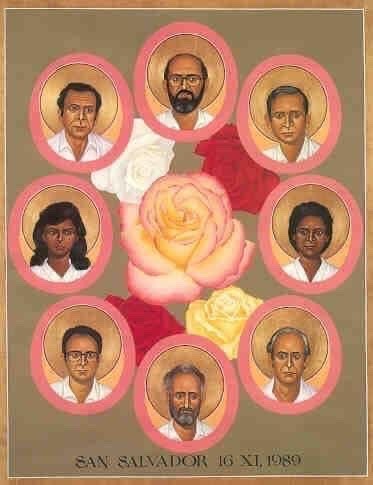
November 16: Jesuit Martyrs of El Salvador
During the Salvadoran Civil War, on 16 November 1989, Salvadoran Army soldiers killed six Jesuits and two others at their residence on the campus of José Simeón Cañas Central American University (UCA El Salvador) in San Salvador, El Salvador. The Jesuits were advocates of a negotiated settlement between the government of El Salvador and the Farabundo Martí National Liberation Front (FMLN), the guerilla organization that had fought the government for a decade. The murders attracted international attention to the Jesuits' efforts for peace and nonviolence, and increased international pressure for a cease-fire, representing one of the key turning points that led toward a negotiated settlement to the war.
Those martyred on that day were: Ignacio Ellacuria Beas Coechea, S.J., the rector of the university;
Ignacio Martín-Baró, S.J., vice-rector of the university, a leading expert on Salvadoran public opinion;
Segundo Montes, S.J., dean of the department of social sciences;
Juan Ramón Moreno, S.J.;
Joaquín López y López, S.J.;
Amando López, S.J.;
Elba Ramos, their housekeeper; and
Celina Ramos, her sixteen-year-old daughter.
All but Celina Ramos were employees of UCA. Another Jesuit resident, Jon Sobrino, was delivering a lecture on liberation theology in Bangkok. He said he had grown accustomed to living with death threats and commented: "We wanted to support dialogue and peace. We were against the war. But we have been considered Communists, Marxists, supporters of the rebels, all that type of thing." When The New York Times described the murdered priests as "leftist intellectuals" in March 1991, Archbishop John R. Quinn of San Francisco objected to the use of that characterization "without qualification or nuance". He offered the paper the words of Archbishop Helder Camara: "When I feed the hungry, they call me a saint. When I ask why they have no food, they call me a Communist."
0 notes
Text

The Child In The Midst
He called a child, had him stand among them, and said, “I tell you the truth unless you turn around and become like little children, you will never enter the kingdom of heaven! — Matt 18:2-3
Our Lord desired to show wherein actual greatness consists. First of all, it begins with Humility. Without this, no one can be His disciple (Mat 18:4). A child is naturally humble until parents and friends begin to spoil it by directing its attention to itself. For us, as for the proud Naaman of old, our flesh must become a little child. Some people are rather proud of their humility and expect to be praised for it, but that is not the genuine humility of which Christ speaks.
The following qualification for greatness is Love. We must recognize and welcome Christ-like souls, however lowly their lot. What a contrast between the boy, whose unfortunate case is described in the previous chapter (Mat 17:14-18), and this little child. But to each, the Lord Jesus proved Himself to be a loving Friend. The one He restored to sanity and health, the other He gathered in His arms. Probably the child was standing or playing quite near Him, so it only needed a very slight gesture to bring him to the Master’s side, and he became the text of the sermon that followed. We must not despise one of the least, for they are the objects of Christ’s particular regard. Our Lord draws aside the veil from the eternal world and shows that the youngest and weakest ones are to whom the loftiest angels are allotted as their guardians. The holy ones of the Presence Chamber, who always behold the face of God, are set to watch over the children.
The third step to true greatness is in the disposition, which is unsparing of self and thoughtful for all others. We dare not put a stumbling block or an occasion to fall before one of Christ’s weakest disciples; we must be prepared to cut off the right hand or pluck out the right eye rather than grieve the Holy Spirit of God. Our attitude about many things which might appear perfectly harmless must be determined by the effect of our influence upon others.
Prayer
Give unto us, O Lord, true humility, a loving and friendly, a holy and valuable manner of life; bearing the burdens of our neighbors, denying ourselves, and studying to benefit others, and to please Thee in all things. Amen.
#allsoulspriory#paxabbey#frjohnkelmy#thefellowshipcorner#dailywalk#christsapostoliccatholicchurch#frjohnpax
0 notes
Text
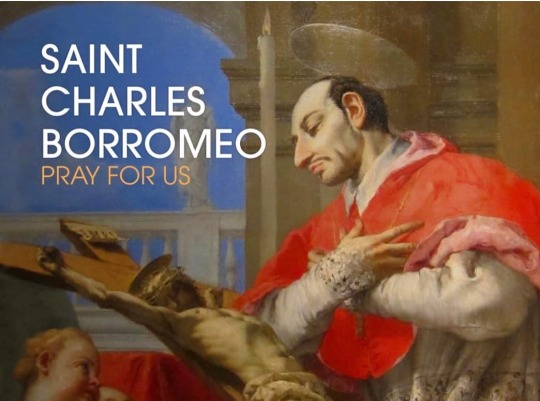
St. Charles Borromeo
Saint of the Day
St. Charles Borromeo (1538–1584) was born into an ancient and wealthy family in Lombardy, Italy. When his uncle became Pope Pius IV, Charles was brought to Rome to take over several important assignments connected with the Vatican. He was ordained to Holy Orders at the age of 25 and was later made Archbishop of Milan, a position of high influence in the Church, and Cardinal. He initiated large-scale reform of his enormous and dilapidated diocese, which had not seen a resident bishop in 80 years. Clergy were ignorant and disobedient, religious were negligent and scandalous, and the laity had drifted from Church teaching. He rectified abuses and maintained the integrity of the Church's internal structure, all for which he encountered strong opposition and threats against his life. He also established hospitals, seminaries, orphanages, and the first Sunday School classes. He was a key player in the Council of Trent and kept it going when it was in danger of breaking up. He was a prominent defender of Church teaching in the Counter-Reformation and helped produce an official catechism. His counsel was widely sought, especially by the Catholic kings and queens of Europe and the popes under whom he served, and his virtue was evident to all. Throughout his life he held his rank and authority with humility, living austerely and constantly striving for sanctity. When plague and famine hit Milan in 1576, Charles stayed in the city to care for those in need and borrowed large sums of money to feed tens of thousands of people each day. Exhausted from his reforming labors, he died at the age of 46. St. Charles Borromeo is the patron of catechists, catechumens, seminarians, spiritual directors, and bishops. His feast day is November 4th.
#allsoulspriory#frjohnkelmy#paxabbey#thefellowshipcorner#christsapostoliccatholicchurch#saintoftheday
0 notes
Text
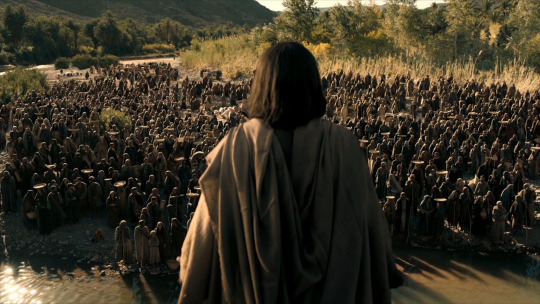
A New Beatitude
Blessed is anyone who takes no offense at me.” — Matt 11:6 NET
Our Lord put within reach of His noble Forerunner the blessedness of those who have not seen and yet have believed; of those who trust Him though they are slain; of those who wait for the Lord’s pleasure; and of those who cannot understand His dealings but rest in what they know of His heart. This is the beatitude of the unoffended, those who do not stumble over the mystery of God’s dealings with their life.
This Blessedness is within our reach also. Sometimes we are overpowered by the mystery of life and nature. The world is so full of pain and sorrow that strong hearts seem to break under an intolerable load. God’s children are sometimes the most bitterly tried. For them, the fires are heated seven times; they suffer, not only at man's hand, but the heavens seem as brass to their cries and tears. The enemy of souls has reason to challenge them with the taunt, “Where is now, your God?”
You and I have perhaps been in this plight. We have said, “Hath God forgotten to be gracious? Has He in anger shut up His tender mercies?” We are tempted to stumble; we are prone to fall over the mysteries of God’s dealings with us. But it is then that we can inherit this new beatitude. If we refuse to bend under the mighty hand of God—questioning, chafing, murmuring at His appointments—we miss the door which would admit us into rich and unalloyed happiness; we fumble about the latch, but it is not lifted. But if we will quiet our souls like a weaned child, anointing our heads and washing our faces, the light will break in on us from the eternal morning. The peace of God will keep our hearts and minds, and we shall enter upon this blessedness of which our Lord speaks.
Prayer
Forgive our sins, our faithless tears, and our repining murmurs. Lift us on the tide of Thy love into fuller, richer, more profound experiences. May we know what it is to have Christ in us, the Hope of Glory. Amen.
0 notes
Text
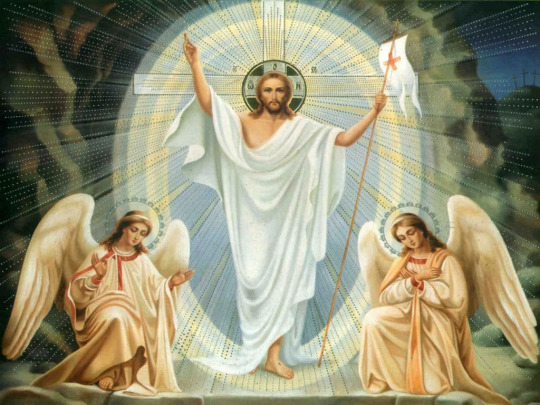
Risen With Christ
Therefore, if you have been raised with Christ, keep seeking the things above, where Christ is, seated at the right hand of God. — Col 3:1
If someone says, “Ha, there’s the rub! I’m afraid that is not true of me; my life is sinful and sorrowful; there are no Easter chimes in my soul, no joyful fellowship with the Risen Lord, no victory over dark and hostile powers.” But if you are Christ’s disciple, you may affirm that you have risen in Him! With Christ, you lay in the grave, and with Christ, you have gone forth, according to the thought and purpose of God, if not in your feelings and experience. This is distinctly taught in Eph 2:1-10 and Rom. 6. The whole Church (including all who believe in our Lord Jesus) has passed into the light of the Easter dawn. The one thing for you and me, and all of us, is to begin from this moment to act as if it were a conscious experience, and as we dare to do so, we shall have the experience.
Notice how the Apostle insists on this: “You died, you were raised with Christ, your life is hidden with Christ. Give yourself time to think about it and realize it.”
The Cross of Jesus stands between you and the constant appeal of the world, as when the neighbors of Christian tried to induce him to return to the City of Destruction. This does not mean that we are to be indifferent to all that is fair and lovely in the life which God has given us, but that the Cross is to separate us from all that is selfish, sensual, and savoring of the lust of the flesh, the lust of the eyes, and the pride of life (1Jo 2:15-17).
Set your mind on things above (Col 3:2). “As a man thinketh in his heart, so is he.” With many of us, there is little attempt to guard our thoughts. The door of our heart stands open, with none to control the ingress or egress of the tumultuous crowd of thoughts that wander in and out. If only we would ask the Holy Spirit to control our thoughts so that we might think only of the fundamental things and good reports, a significant change would pass over our life (Phi 4:7-8).
Realize that Christ is your life—He is in you! See to it that nothing hinders the output of His glorious indwelling. Never mind if the world of men misunderstands you. Some day your motives and reasons will be manifested (Col 3:4).
Prayer
Grant, most gracious God, that we may love and seek Thee always and everywhere, and may at length find Thee and forever hold Thee fast in the life to come. Amen.
0 notes
Text
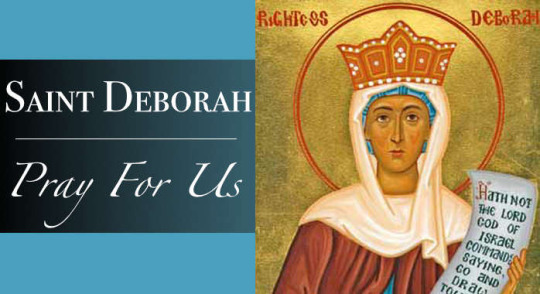
St. Deborah
Saint of the Day
St. Deborah (11th c. B.C.) was a godly widow and saint of the Old Testament. She was a courageous prophetess and champion of the Israelites. All Israel came to her to judge their disputes, and God prophesied to Israel through her. She was Israel's only female judge. Her role as the military leader who defended the Israelites is commemorated in the Bible's "Song of Deborah." It was her military counter-attack against Sisera at Mount Tabor that successfully delivered Israel's enemies into their hands. As prophetess, she foretold that Israel would have peace for 40 years following this victory. St. Ambrose and St. Jerome observed that St. Deborah is a good role model for the encouragement of courageous, godly women. Her feast day is November 1st.
#allsoulspriory#frjohnkelmy#paxabbey#thefellowshipcorner#christsapostoliccatholicchurch#saintoftheday
0 notes
Text
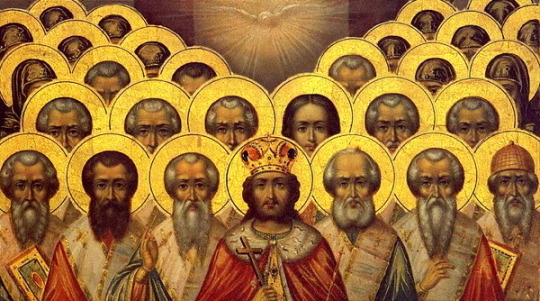
November 1: Solemnity of All Saints
All Saints and All Souls comprise the two-day celebration of the Communion of Saints – those who are with God in heaven and those who are on their way to heaven. On the Solemnity of All Saints, November 1, the Church celebrates those Christians who achieved spiritual maturity.
1 note
·
View note
Text

Our Eternal Destiny
“Again, the kingdom of heaven is like a net that was cast into the sea that caught all kinds of fish. When it was full, they pulled it ashore, sat down, and put the good fish into containers, and threw the bad away. It will be this way at the end of the age. Angels will come and separate the evil from the righteous — Matt 13:47-49
There is a contrast, and yet a similarity, between this parable and that of the tares. In the latter, we learn that it is impossible in the present age to separate the evil from the good in the professing Church of Christ; in the former, we see that with an inevitable pressure, we are all being drawn towards the discrimination of the judgment-seat of Christ.
What a confused mass of dead and living things are brought to shore by a net—weed, mud, shells, unwholesome things, and those suitable for food, lie in a confused heap together. So it is with the professing Church. It embraces every variety of character—good fish amid a certain amount of rubbish, and there is no society of men and women in which this mixture does not obtain. Our Lord teaches that when the great net of the Gospel dispensation has been drawn into the shores of eternity, then, with unerring judgment, the angels will begin their work of separation.
The service determines the distinction which separates the good and the bad we can render in God’s Kingdom. He wants those who will cooperate with Him in the work of redemption, who are living unselfish and consecrated lives, through which His Spirit may work for the highest purposes of salvation. Those whom He rejects are the selfish, worldly, and sense-bound natures, who refuse to be the implements and instruments of His redemptive purpose.
To which of these two classes do we belong? Are we willing to be identified with Christ in His Cross and shame? Do we delight in mercy, self-sacrifice, and holy service? If so, we may anticipate the future without fear. But if, on the other hand, we are shut up within ourselves, even though it be the enjoyment of religion, without tears for men’s sorrows, or yearning for their salvation, we may question whether it may not be our lot to be cast away on the rubbish heap (1Co 9:27).
Prayer
O Lord, we acknowledge Thy dominion over us; our life, our death, our soul and body, all belong to Thee. Grant that we may willingly consecrate them all to Thee and use them in Thy service. Amen.
0 notes
Text
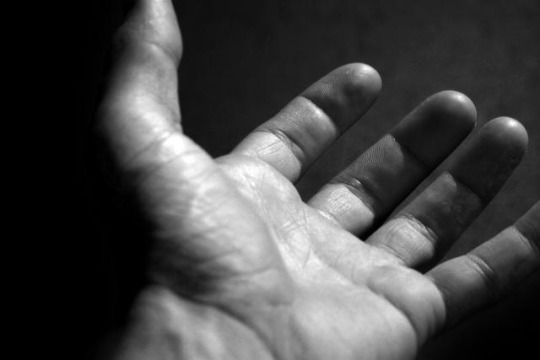
A Living Spring
If your hand causes you to sin, cut it off! You should enter into life crippled than to have two hands and go into hell, to the unquenchable fire. — Mark 9:43
Our Lord calls all who love and would follow Him to present themselves as living sacrifices, even though in the process, they should be exposed to salt, with its searching sting, and fire, with its consuming flame (Mar 9:49). In such moments He reminds us of something which He sees to be hindering our highest ideals. There is only one alternative—though it is dear as right hand or foot, we must cut it off! Of course, it is best to retain the members and faculties of our body in purity and righteousness; they are the most critical assets to the working force of a successful life. No one has a right to perform an amputation unless it is the only alternative to death or the uselessness of Gehenna, which was the rubbish heap of Jerusalem.
Our Lord was well advised when He said, “Cut it off!” The one swift, an irrevocable blow is the easiest in the end. It may be a friendship that is causing us to stumble; or an evil habit, sapping our nervous energy; or a form of amusement, which may be innocent enough in itself—but whatever hinders us in our spiritual progress, if we cannot master it and keep it in bounds, must be yielded to the knife. We often expose ourselves to more anguish in our effort to retain and restrain than to remove absolutely and forever.
Maimed lives are nevertheless solid and complete. Notice those words: “‘Enter into life maimed.” Some emphasized their losses, sacrifices, and privations; others dwell upon life and refuse to consider the straitness of the gate through which they press. True, they are maimed, but by the forfeiture of the lower, they gain, the higher, and by way of the Cross, enter into the Joy and Glory. There are great compensations for us all if we dare to follow the ideals that beckon to us from the snow-capped pinnacles above. Surrender all that impedes and hinders your highest life, and fountains will burst forth in an abundance that will make the desert blossom and sing. Is not this better than to be a castaway from the hands of Christ as unclean and useless?
Prayer
Most Blessed Lord, may we drink so profoundly of Thy Spirit that we shall be willing to surrender all that hinders us in following Thee absolutely and always. Amen.
0 notes
Text
Saint Anthony Mary Claret
https://ucatholic.com/saints/anthony-mary-claret/?fbclid=IwAR1O-SBLOGYJCeLq47nhyQ7Oh6Df0VKjAbgq7pI5luCgm-VjY0rsQ9JJ4QU&fs=e&s=cl
0 notes
Text
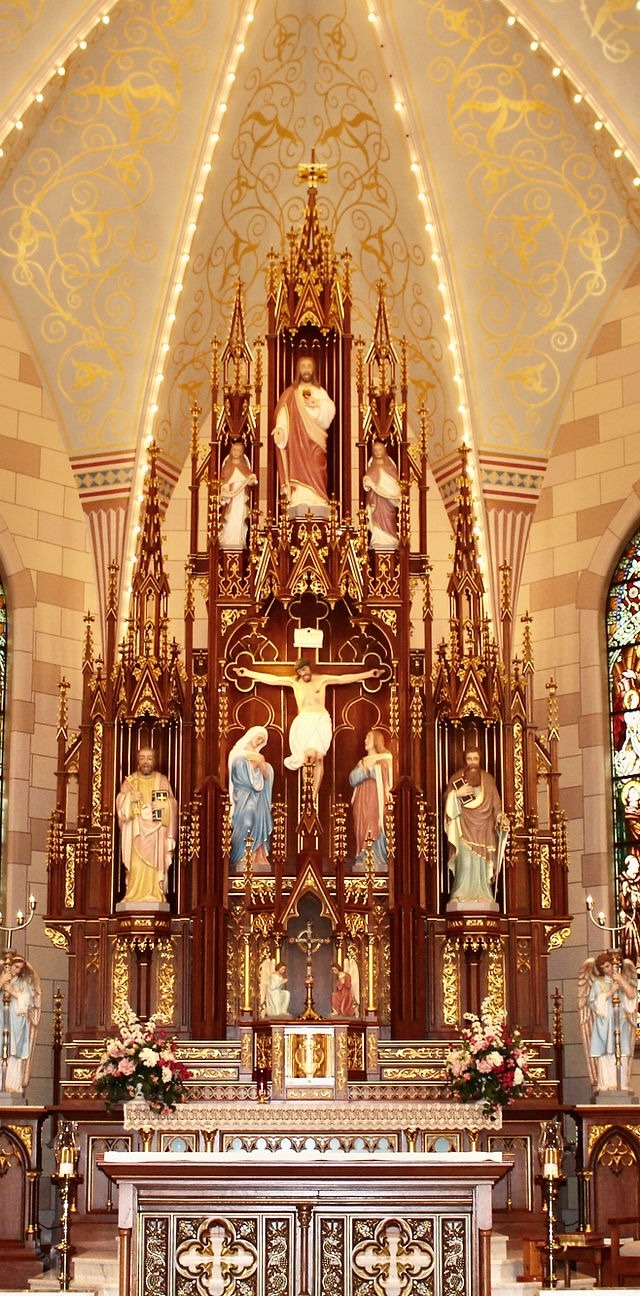
My Guest-chamber
Wherever he enters, tell the owner of the house, ‘The Teacher says, “Where is my guest room where I may eat the Passover with my disciples?”’ — Mark 14:14
There had been a previous understanding between our Lord and the good man of the house, who was probably a devoted friend and follower. Jesus knew that The chief priests were plotting his death and that Judas desired to betray Him that night. He wanted to take part in the Passover Supper and therefore did not tell the two disciples, whom He sent to prepare the supper, where it was to be held, lest any should overhear and His arrest should take place. The locality of that last gathering with His disciples was revealed to the two by the sign of the man bearing the pitcher of water when they reached Jerusalem and only to the remainder of the party when they arrived.
Our Lord knew what treachery meant in the home circle. You may be experiencing this. Your familiar friend, whom you trust, may be unreliable—a sieve through which your secret confidences filter or an adder waiting to sting! But Christ experienced this also and suffered, as we all do, from the feeling of restraint in the presence of one who is unsympathetic and critical (John 13:31).
Jesus knew what devoted friendship meant. What He could not confide to the band of apostles, He was able to make known to the good man of this house. They had conferred together and arranged that this room should be at the Master’s disposal, furnished and prepared for His reception.
Our Lord asks us for the use of our guest chamber. He still stands at the door and knocks, saying: “If any will open the door, I will come in and sup with him, and he with Me.” There is a room in each heart, which He covets for Himself. The Revised Version inserts the word “My.” We are His by right of creation and redemption; let us be His by choice. Having given the guest chamber of our heart to Him, may we not go on to provide our spare room to His disciples and our loving hospitality to those who go forth for the sake of His Name (3 John 1:5-8).
Prayer
Is there a thing beneath the sun That strives with Thee my heart to share? He, tear it thence, and reign alone, The Lord of every motion there. Amen.
1 note
·
View note